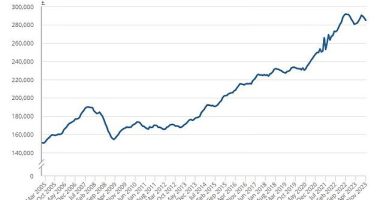
Britain’s biggest building society Nationwide has spoken out on what it is doing to help flat owners in blocks with cladding-related fire safety defects, who are struggling to remortgage or move home.
These leaseholders are required to have what is known as an EWS1 form to prove their building is free of fire risk cladding if they want to sell or remortgage. Without it, lenders will not offer a new mortgage on those affected apartment blocks without paperwork to prove the building is safe.
But many owners have been unable to get these forms – with some told to expect years of delays and their homes are worthless without one – leaving them unable to move as potential buyers cannot get a mortgage.
Nationwide, which is Britain’s second biggest mortgage lender, outlined how it plans to help those affected in an interview with MailOnline Property and This is Money.


Since the Grenfell Tower fire in 2017, concerns have increased about fire safety defects
Nationwide said it is working hard to resolve the cladding issue and called on the country to work together on it.
Rob Stevens, of Nationwide, said: ‘People are really nervous about it and I can see why, given the huge impact it is having. It is complicated though and changing things in a responsible way requires people to work together to create a solution.
‘Ultimately there are two main issues – the safety of the building and the cost of any remedial work along with who is responsible for paying for them’.
‘These two issues are linked and once resolved, everything else falls away.’
The Government announced at the weekend that the forms would not be required for those leaseholders living in blocks without cladding.
But lenders responded through their industry body, UK Finance, saying this was not the problem at hand and that an EWS1 has never been required for buildings without any form of cladding.
Buyers can check on a new website to see the EWS1 status of a building they are interested in.
Mr Stevens confirmed: ‘We are not asking for EWS1 forms on all buildings apart from those with safety concerns.’
He added: ‘The key element for leaseholders is this EWS1 form, as once you get one back with the appropriate safety rating, you can proceed with your remortgage or sale.’
Without the forms in these circumstances, a buyer will not be able to proceed as the lender is unlikely to provide them with a mortgage, given the unknown safety status of the building.
Many flat owners are also being told they will have to fund remedial work, despite their block being owned by a freeholder and properties bought in good faith as having fully complied with building regulations when constructed.
What rating is required?
Nationwide confirmed that it will lend on properties with an EWS1 form that are given a rating of A1, A2 or B1.
If there are questions about the building’s fire safety and works are required, it will have a rating of A3 or B2. In these cases, the mortgage approval would be dependent on providing other information, such as who is paying for the works and whether there is a robust plan for the works in place.
Mr Stevens called for a list of what buildings are safe and adhere to 2018 building regulations. He said that hopefully the launch of the EWS1 portal will provide this going forward.
He also went on to say that freeholders may have inherited the building and also bought in good faith. The freeholder has a duty to carry out the repairs, and is contractually entitled per the lease to charge leaseholders for them.
The issue has been that people bought the properties in good faith and the buildings have proved to be defective.
The Government has currently set aside £1.6billion to cover the cost of remediating affected buildings. Yet, the Housing, Communities and Local Government committee has previously estimated that the figure could be as high as £15billion that’s required.
A cross-party committee of MPs said in a recent report that leaseholders should not be liable for the costs of the repairs.
Mr Stevens said: ‘The solution to the cladding crisis is to make the buildings safe and the best way to achieve this would be through the expansion of the building safety fund to cover all affected properties.’


The Government has set aside £1.6billion to cover the cost of remediating affected buildings
One leaseholder who has still yet to even obtain an ESW1 form is Josh Ormston, 29, who lives alone in a flat in Royal Quay, Liverpool.
He said that the 160 flats in his block have so far been asked to collectively pay £32,000 per month for a 24 hour walking watch.
He also said that their insurance has increased, which has led to a hike in the service charge.
He said: ‘The cladding needs to be changed. There are issues with the fire breaks in the walls as well as timber balconies. There is no cost yet but this is likely to be substantial.
‘The cost could be at least £50,000, and is unfair that the leaseholders are responsible for this. There is no way I would be able to pay this.’
He added: ‘This situation for me is dire. My flat is currently valued at £0 without the EWS1 form so I am stuck here.
‘I am potentially facing a bill of thousands of pounds to fix the issues in a building I don’t even own, through no fault if my own.
‘There is a potential I could lose my home and end up bankrupt if I am forced to pay for the remediation.
‘It is safe to say my mental health is taking a beating. I hope the Government steps in and help millions of others like me.’
Liverpool City Council confirmed it took on the freehold in January this year and that an application had been made to the building safety fund.








